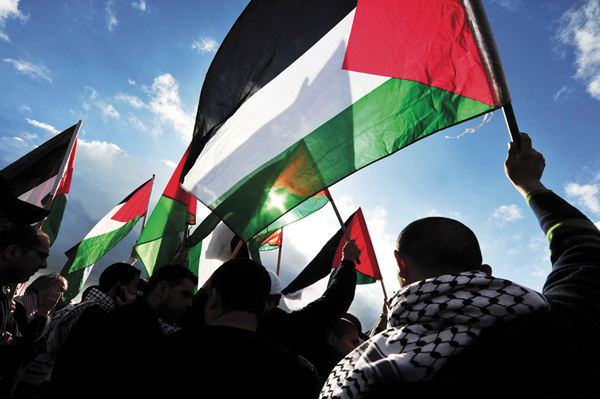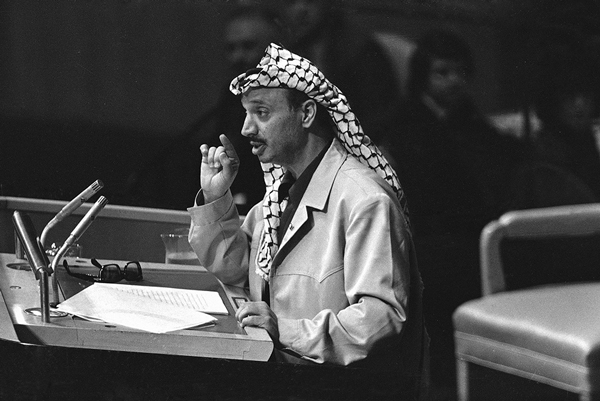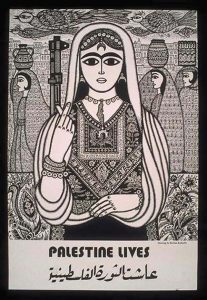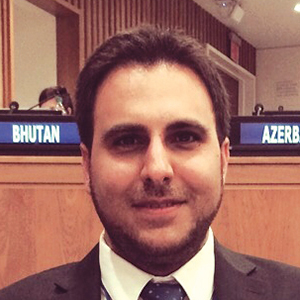
To Marwan Barghouthi and the Palestinian prisoners, who from behind bars remind us that the jailer and the oppressor shall never prevail.
To understand what the PLO meant for Palestinians at its establishment, you have to take into account what it meant to be dispossessed of your land, of your past and present, of the promises of your future, what it meant to grow up in refugee tents, to lose everything, and to see your very existence denied by those who removed you from your land. Palestine has not witnessed the worst atrocities, but it is the victim of one of the greatest injustices of our time.
At a time when the world adopted the fundamental texts of international law, including the UN Charter, the Universal Declaration of Human Rights, and the Geneva Conventions, the Palestinian people were denied the very same rights that these texts were adopted to protect. Instead of seeing our right to self-determination fulfilled, our nation was and continues to be the victim of a widespread and systematic policy of displacement and replacement at unprecedented levels. The Zionist movement openly advocated changing the demography of this land, on a discriminatory basis and with total disregard for the indigenous population, going as far as denying its very existence.
♦ The PLO empowered the Palestinian people and provided the national struggle with a central voice. Accessing international bodies, such as the United Nations, has been one of the most important tasks in its mandate to represent the Palestinian people, returning Palestine to the international agenda.
Since then, Israel has been rewriting history and transforming the landscape to fit its narrative. Israel launched a war against our people and our homes, and even against the signs of our uninterrupted presence on this land for thousands of years as a nation that kept growing more diverse as history brought to our shores many people who became an integral part of who we are. This is the Nakba. It started in 1948, and almost 70 years later, the Palestinian people still struggle for their natural place in history and geography.
We became a nation of refugees, and many – even among our own people – thought we had become helpless. But instead of disappearing, our national identity was strengthened by the tragedy. And barely a few years later, we Palestinians started to organize on our own. When the PLO was established by the Arab League, Palestinian factions saw an opportunity and took it, creating what we have called a moral home for Palestinians. The PLO was us proclaiming our existence to the world, it was us unifying our forces to move from desperation to hope. It was us saying we will not surrender, and whatever the might of the Zionist movement, the right of our people to self-determination shall prevail. Arafat’s smile and keffiyeh were the manifestation of our nation’s resolve, a resolve the world could no longer ignore. This is why people were ready to die defending the PLO and the independent national decision. We had finally found a Palestinian voice, and we were not ready to let anyone silence it. This is why Israel’s war against the PLO was not only against its political and military leaders, but also against its representatives worldwide. As Palestinian diplomats, we have a unique legacy because our representative offices abroad were opened at the price of martyrdom for many of our representatives.
♦ When Palestine became a “non-member observer state” at the United Nations, resolution 67/19 reaffirmed the PLO as the sole and legitimate representative of the Palestinian people.
The PLO marked a dramatic change in our history when we decided to save ourselves since nobody seemed willing or able to save us. There was nothing more empowering, more assertive, more reflective of Palestinian resilience and determination than the decision to lead our own struggle, with our limited means, in a battle of mythological dimensions. Maybe some laughed at these young people who apparently had not heard the news that they had been defeated and who actually believed victory could be achieved. But in 1967, Arab armies were crushed by Israel during the rule of the legendary Gamal Abd el Nasser who was a source of hope for an entire generation. While a few months later, the infant Palestinian national movement was able to push back the attack of the Zionist forces in the battle of Al-Karameh (dignity). Finally, all those who wanted to work for the liberation of Palestine, Palestinians of origin and Palestinians of heart, had an address. We understood our diversity – political, religious, ethnic – not as an element of division but as an important component of our identity, and despite all the differences, Palestinian factions maintained a unified voice to speak on behalf of our people.
The PLO was recognized worldwide as the sole and legitimate representative of the Palestinian people; and Palestinians recognized the PLO as an affirmation of their existence and their struggle. Palestine refugees proclaimed through the PLO the right to be the masters of their own fate, after having been the victims of the decisions of colonial powers that disregarded them and their rights.

In 1982, when the PLO was driven out of Beirut by Israeli forces, to be exiled far away from Palestine borders, some thought that this would be the end of it. They did not understand that while the PLO was established by Palestinian refugees outside the borders of Palestine, it was also nurtured and loved by those under occupation and Israeli rule. The Intifada was the eruption of the Palestinian people under occupation onto the world stage, and because the PLO was faithful to the people, the people were loyal to the PLO. Despite Israeli policies of mass arrest and killings, its assassinations of the leaders of the Palestinian struggle, and maybe because of all that, the Palestinian people considered defending the PLO to be an integral part of defending Palestine. In the Madrid talks for peace in 1991, no Palestinian delegation was allowed to participate independently of the Jordanian delegation, and the PLO was not to be represented. And yet, those who unofficially represented the Palestinian people at these talks proved to be as attached to the PLO as its founding fathers.
But the PLO was besieged politically and financially after the Gulf war, and Israel had managed to assassinate several of its most influential founding fathers. The PLO thus considered the Oslo agreements as the only way to save itself, and maybe this weakness at that point in time and the disproportionate existential fear of alternate representation made it overlook essential aspects that were not properly addressed by the agreement. Since then the PLO transferred important competences to the Palestinian Authority. The PLO was maintained in its representative role, but its decision-making powers grew slimmer to mirror the expansion of the role of the Palestinian Authority. We were moving towards an independent state and the Palestinian Authority was the bridge towards that goal; therefore many believed that there was a need to invest in it. Had we not been stuck in limbo for the last 20 years, their analysis might have been correct.
The PLO’s role is the fulfillment of the inalienable rights of the Palestinian people. Once this is accomplished, it is normal for it to disappear. But Israel further entrenched its military and colonial rule instead of ending it. There was therefore still an important role for the PLO to play, but systemic problems had appeared over time, including the fact that important factions, notably Hamas, decided to remain outside the common home. The PLO saw cadres that preferred to join the Palestinian Authority with its role on the ground rather than the PLO and its political representation role. Thus the perception of its role among the Palestinian people changed. The PLO was strong because it was a common address, because it projected power and defiance, because it empowered people, because it was the place for pluralism and debate, because it brought to the struggle a new generation of Palestinians. The absence of these very same factors has taken its toll. While the Palestinian people are fully conscious of the importance of preserving their moral home at a time when independence still seems out of reach, they will defend the PLO but they will not fully belong to it, because that requires that it fully belong to them. They need it to be part of their lives, to be shaped by their choices, to be their reflection, and what brings them together.
The PLO is the biggest accomplishment of our struggle, affirming our identity and enabling our unity and determining our fate. The ongoing division, the difficulty of shaping a clear and unified strategy, and having popular support are motives for the PLO’s crisis and are motivated by it. The PLO does not necessarily need to manage the daily lives of Palestinians, it needs to honestly represent them, to be once again the place where we start practicing our right to self-determination; it should be a name that carries every son and daughter of this land, including its refugees and its diaspora. The PLO doesn’t need to be the government, but it needs to be the political leadership of our people. PLO strength was also drawn from the strength of our factions and trade unions. It cannot be fully revived in isolation of the intermediary bodies that comprise it.
Some may feel that this is becoming increasingly impossible. But I remind them of a few young people who in exile and after a traumatic tragedy, found their way from the ashes of the Nakba to the path of resurrection. Their odds were far worse than those confronted by our generation. The Palestinian people are now recognized worldwide, including by those who tried to erase us. Our rights, including that of self-determination, were endorsed internationally. Solidarity with Palestine has become a rallying cry across all continents. Millions of our people are still steadfast on our land, and we have become yet again the majority in historical Palestine despite decades of displacement and replacement. Palestinians in the diaspora are self-confident and proud of their identity. This is the legacy that we have received from the PLO, and we have a duty to shape a legacy for the generations that will follow us.
I do not deny any of the objective reasons to consider this period an extremely difficult one; I do not deny the existence of blockades and walls, of regional conflicts that heavily impact and inflict suffering on our people in exile, the killing of civilians, and the ongoing mass arrests; I do not deny the structural weaknesses that have affected us, the open wound caused by the division, and the democratic crisis of refugees in exile not voting for their representatives for nearly 30 years and of the impossibility of holding elections in the occupied Palestinian territory for over a decade. I do not deny the spread of colonialism and the creeping annexation that reaches every home. I do not deny the arrogance of the occupying power and its impunity. I do not deny that peace despite conferences and summits continues to be evasive. But I trust the Palestinian soul. And yes I have faith.
♦Israeli agencies assassinated several PLO officials around the world, including diplomats and artists. This was a failed Israeli attempt to silence the Palestinian people. Today, several of the capitals that witnessed such assassinations have full-fledged Palestinian embassies.

This is a land of miracles, and I think that the birth and survival of the Palestine liberation movement is nothing short of a miracle. We are entitled to freedom, dignity, and return as all other nations around the world, and to ending the historical injustice and seeking redress. Our struggle is, however, not only a struggle against oppression, it is also a struggle against exclusiveness and exclusion, monopoly and supremacy, discrimination, segregation and apartheid. It is a struggle to preserve pluralism and diversity. As such, we are the guardians of the Holy Land, and the reflection of its unique history and geography. Jerusalem must be a capital of peace and coexistence, and then, instead of being a reflection of what is worst in the world, it can be a beacon for change and hope beyond our borders. I have faith. If a man who has spent decades in Israeli jails finds it in himself to defy the jailer and to proclaim his right to freedom and dignity, for himself and for his nation, if he can find hope in the darkness of a cell, I have to wonder: Why wouldn’t I? And you should ask yourself the very same question. Our answer will be the most decisive element for the future of our people and our cause, which matters not only to us, but to all those who believe that we are born free and remain free and equal in rights; to those who defend human dignity regardless of origin, nationality, ethnic group, race, gender, or social condition; to those who strive for justice and peace around the world.
» Majed Bamya is the head of the international treaties department at the Palestinian Ministry of Foreign Affairs and in charge of the prisoners’ portfolio. He is the general coordinator of the international campaign for the freedom of Marwan Barghouthi and all Palestinian prisoners.


